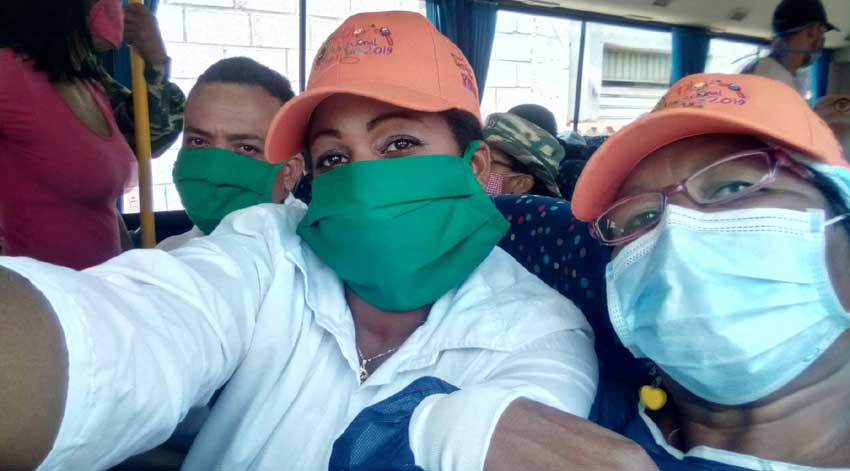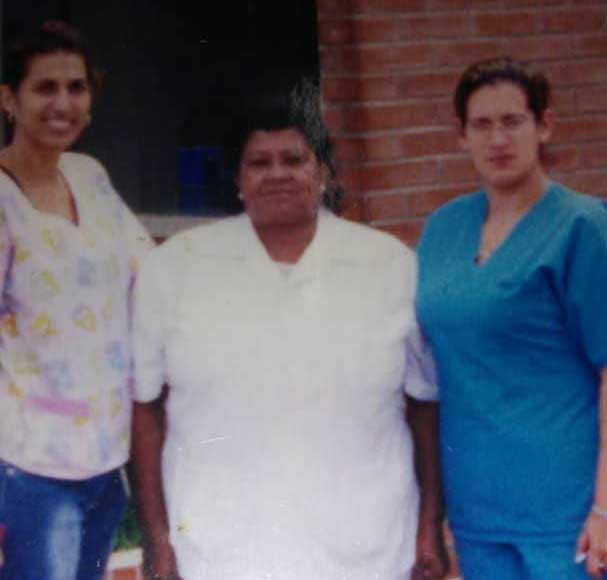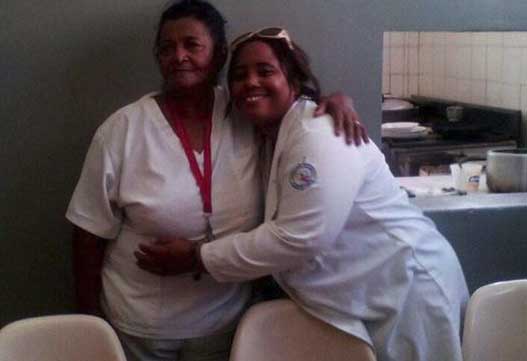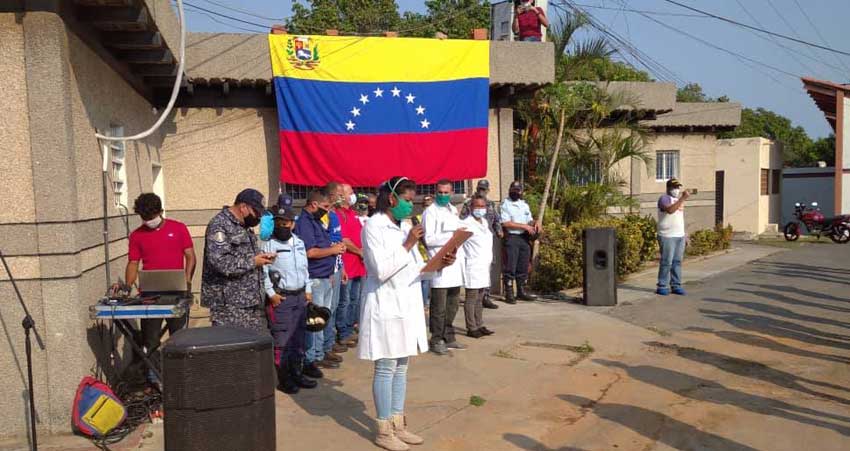
The women of the La O Zayas family seem to bring in their blood the will to heal and distil humanism through their pores. It is a story that perhaps in some mysterious way began there, in a remote neighborhood called Mateo Sánchez, belonging to the municipality of Mayarí, in the province of Holguín.
Through the paths that life takes, Las Tunas became the melting pot of their loves and here they sowed the seeds of a name that, between the blow of the pylon and the wood stove, conquered respect. Before that, they left deep traces in their hometown and the Mártires de Mayarí hospital. Among these "worlds", the traces remain and today the people of Mayarí feel those white streams that they carry with altruism, linked to one of the professions that gives life and social welfare: Public Health.
ROOTS OF MEMORY
Evangelina Zayas had African and Mambi blood. Humility and courage multiplied her loaves and fishes to raise her children, five females and two males. The darkness of the mountain did not appease her and she was seen as a midwife on those roads. From the wisdom of serving and growing up under the sun and the misfortunes they drank, without a doubt, their children.
For old Fermin La O, the days and weeks were the color of time. If it rained, there was harvest, food and peace. In drought and bad weather, sleeplessness and fear. So, jumping stones and barefoot, the offspring broke through the ignorance at a little school nearby. Life turned the leaf. "Mateo Sánchez" was left behind.
The girls and one of the boys went out to look for the light that brought the year 1959. The dawn of January they could not lose it. Those blacks were dreaming loudly to continue in that small farm of grays and poverty. They tightened their belts and looked for their mornings.
OF ALL, A LITTLE
 Being a nurse was a beautiful choice that was right in front of their eyes. They had to finish their studies and prepare the way for the future. María Antonia wanted to study. She finished high school in 1966 and passed the emergence course. At the age of 18 she entered the rural hospital of Arroyo Seco, in Pinares de Mayarí, dressed in the uniform of dreams. Studying and working she won the 12th grade. And in the "Mártires de Mayarí" she climbed her next goal: to become a nurse-midwife in the hospital of Holguín. She never imagined that this would be the bridge that would definitely bring her to Las Tunas.
Being a nurse was a beautiful choice that was right in front of their eyes. They had to finish their studies and prepare the way for the future. María Antonia wanted to study. She finished high school in 1966 and passed the emergence course. At the age of 18 she entered the rural hospital of Arroyo Seco, in Pinares de Mayarí, dressed in the uniform of dreams. Studying and working she won the 12th grade. And in the "Mártires de Mayarí" she climbed her next goal: to become a nurse-midwife in the hospital of Holguín. She never imagined that this would be the bridge that would definitely bring her to Las Tunas.
The deficit of that specialty located her, in the 70's, in the rural assistance center of Bartle, where she retired after 44 years of work. She fulfilled her mission in Duaca, Venezuela, in the state of Lara, in 2007. Today she is a happy grandmother and mother of many children there, where she never gives up being a nurse and no one forgets that they gave the first cry into her hands.
Juanita, the eldest, was inclined to be an assistant in Stomatology, but ended up as a general assistant in the hospital center of the municipality. She has two medical granddaughters.
Martha caught the roots of wearing the cap until "strength takes over". In time, she arrived at Lenin Hospital and wove her way through it. The "Guevara" knows her steps by heart and her love for the Infirmary.
Not long ago she returned from the hills and gave birth to "Barrio Adentro" with her daughter, the doctor and specialist in General Integral Medicine (MGI in Spanish) Iris Lidia Brooks. For the second time she was an internationalist.
Julia, another of the daughters, after joining the Ana Betancourt Schools in Havana as a young peasant girl in 1961, took a course in Health Administration. While Bertoldo, one of the boys, also embedded his heritage in Public Health. Both daughters work at the Ernesto Guevara de la Serna Hospital. Niurka is secretary of the Intensive Care Unit and Norma is head of Dietetics. Noelia, the other sister, is an assistant in Stomatology.
It is not only the love for saving lives and white coats that unites them. Dania, who stayed to live in Mayarí, won her mission in Venezuela there, another link that connects them. Meanwhile, here, Dr. and MGI specialist Maria de los Angeles Gutierrez, Julia's "heiress", was selected for that call and both are in the state of La Guaira. They had already met in Barinas.
THE MYSTERY OF URIMARE PARISH
 Dania y María de los Ángeles never imagined that a pandemic would overwhelm her chest in the middle of the hills. A whirlwind of shocks was inevitable. The first cases were reported in Cuba. However, the new challenge left them little time. The dynamics of the work had one essential objective: to survey the community. There the aunt and niece left. They received the necessary preparation and every morning, for a little more than two months, they have been fighting for their lives.
Dania y María de los Ángeles never imagined that a pandemic would overwhelm her chest in the middle of the hills. A whirlwind of shocks was inevitable. The first cases were reported in Cuba. However, the new challenge left them little time. The dynamics of the work had one essential objective: to survey the community. There the aunt and niece left. They received the necessary preparation and every morning, for a little more than two months, they have been fighting for their lives.
It all began when COVID-19 spread like cursed smoke around the world. Dania was the State's teaching advisor, but the responsibilities assumed by the Cuban collaborators in their Integral Diagnosis Centers (IDCs) were brought back together.
This is the first time we have worked together," Maria de los Angeles tells me on Messenger. Seeing my aunt in my IDC in Guaracarumbo, taking the bus every day to get to our destinations and feeling her with me has been wonderful. I was impressed by her skill, her knowledge and her motivation to always be better.
For Dania it is not less significant to accompany her niece. Her chest beats with the emotions and memories of "the little black girl she saw grow up". In spite of the family closeness, discovering her as a woman and a disciplined and competent professional moistens her eyes.
Under her feet move the mysteries that hide the stretches and the hills of the Urimare parish, from humble people, who receive them with gratitude and trust. They, between astonishment and will, give themselves up to raise the heartbeat of the island in the lands of Commander Chávez.
There is no tiredness even if the legs hurt. The vital thing is that they do not appear sick in La Guaira. This is the principle of strength of all the collaborators there.
CLOSED STORY?

Helpful, cheerful, and "wild" for work, these sweet black women are like white streams in the streets, the mountains, the labor rooms, the laboratories, the plains and the mountains. None of them look for the whys and wherefores of this passion for Medicine. Fulfilling their missions, duties and tasks is primary.
Diplomas, medals and recognitions endorse it. I don't think I'll bet for pleasure if I leave this story open. From the mountains and from Evangelina's womb came these mambisas, who make their white coats shine with dignity. The genes are alive. The generations to come will have the last word. It is only a matter of time. The truth is that hundreds of Cubans and Venezuelans, inhabitants of Las Tunas and Holguín owe their lives and happiness to them.




